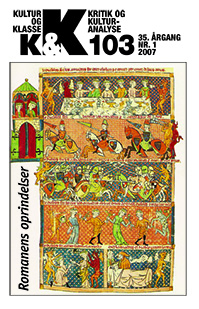Robinson Crusoe på romanens tærskel
DOI:
https://doi.org/10.7146/kok.v35i103.22302Keywords:
Robinson Crusoe, roman, tærskel, Ian Watt, The Rise of the Novel, Defoe, liminalAbstract
Robinson Crusoe on the threshold of the novel
Just as Ian Watt did in his classic reading of Robinson Crusoe in The Rise of the Novel, this article argues that Defoe’s well known book stands in a liminal relation to the novel as an emergent literary form. Watt argues that the liminality of Robinson Crusoe is caused by the book’s excessive thematic focus on an entrepeneurial individualism. Through an examination of the text’s discursive status at the time of publication (1719), this study argues that a more fundamental factor is the book’s relation to an emergent, but not yet established concept of fictionality. Originally, Robinson Crusoe was not read as a literary fiction, but as a book whose claim to facticity was contested. The study examines both the historical background for this difference, which is to be found in the print culture of early 18th-century London, and its hermeneutical ramifications.
Downloads
Published
How to Cite
Issue
Section
License
Tidsskriftet følger dansk ophavsret.





